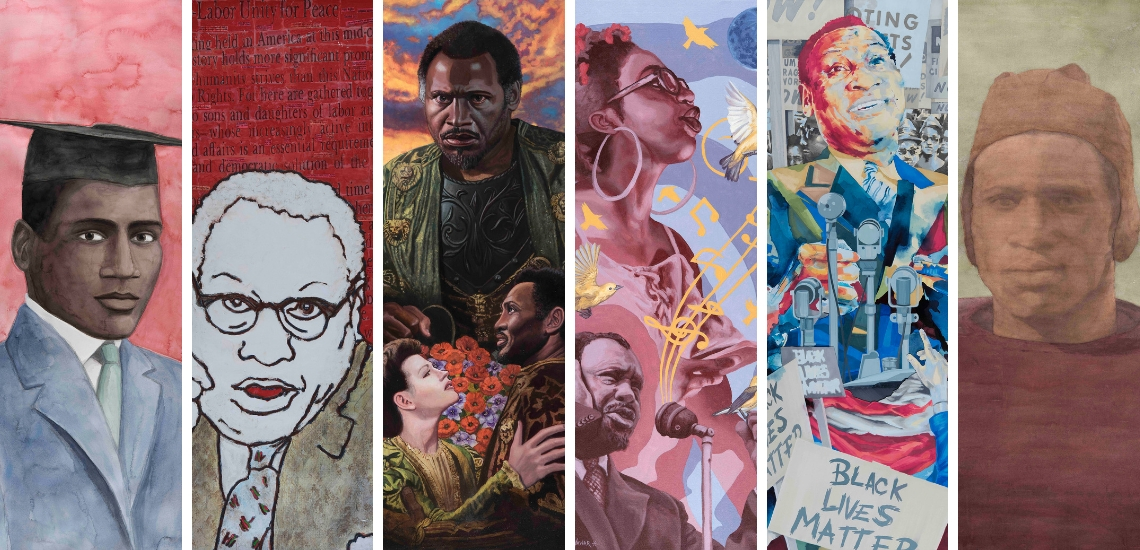Paul Robeson: An Extraordinary Life
Rutgers University–New Brunswick is honoring Paul Robeson’s legacy as a scholar, athlete, actor, singer and global activist in a yearlong celebration to mark the 100th anniversary of his graduation. Check back with Rutgers Today throughout the year as it presents a special series chronicling Robeson’s life and his influence on generations.
A Conscious Choice: Paul Robeson's Legacy
By the time he turned 65, an ailing Paul Robeson felt both unappreciated for and unsatisfied with all that he had achieved. Martin Duberman, author of the biography Paul Robeson, writes that since childhood the actor, singer and social activist had struggled to live up to the dictum preached by his father, “that he should always do better and more.”
Read the Rutgers Today articlePaul Robeson's Journey to Activism
In late 1946, after launching an antilynching crusade in Washington, D.C., Paul Robeson and a handful of colleagues visited President Harry Truman in the White House.
Read the Rutgers Today articleExamining Paul Robeson's Connection to the Jewish Community
The Allen and Joan Bildner Center for the Study of Jewish Life is bringing together four leading historians to examine Robeson’s relationship with the Jewish community, socialist movements, and the Soviet Union in the 1940s.
Read the Rutgers Today articleCrossroads Premieres 'Paul Robeson' at NBPAC's Grand Opening, 'Lion King' Actor to Star
Creative Director Marshall Jones discusses Rutgers’ connections throughout theatre company’s history
Read the Rutgers Today articlePaul Robeson's 1919 Rutgers Commencement
A year after his father died, Paul Robeson stood before the mostly white audience gathered for Rutgers’ 1919 commencement and delivered an address that he had entitled “The New Idealism.” From a young age, the 21-year-old had been trained by his father, William, a former slave turned pastor, in both the classics and oratory. So vocal delivery was perhaps as important as the message. But he did have something important to say.
Read the Rutgers Today articleBeating Princeton to Settle a Score
On Paul Robeson’s last day at Rutgers, one of his dreams came true. And it didn’t take place on the football field or in a classroom. It happened on the baseball diamond. Rutgers beat Princeton, a feat that had eluded Robeson since his first year.
Read the Rutgers Today articleRutgers Dedicates Plaza to Paul Robeson, Renaissance Man for the Ages
Celebrating the 100th anniversary of the graduation of its most acclaimed alumnus, Rutgers University dedicated a plaza named for Paul Robeson on Friday to honor his legacy as a distinguished a scholar, athlete, actor and global activist for civil rights and social justice.
Read the Rutgers Today articlePaul Robeson: All-Around Excellence
Paul Robeson excelled in academics while persevering in the face of bigotry that kept him from social events and prevented the two-time All-American from staying in the same accommodations as the football team or traveling with the glee club.
Read the Rutgers Today article.New Brunswick's Commercial Avenue Renamed for Paul Robeson
One of the city’s busiest thoroughfares has been renamed for one of Rutgers’ most famous alumni.
The New Brunswick City Council recently voted to rename Commercial Avenue for Paul Robeson as the city moves ahead with plans to honor the legacy of the scholar, athlete, actor, singer and global activist by making his name a prominent part of the city landscape.
Read the Rutgers Today articlePaul Robeson Football Star
As a first-year student at Rutgers College during fall 1915, when Paul Robeson was the sole African-American student on campus and only the third to be enrolled in the 149-year-old school, he held a white classmate over his head in rage and thought he wanted to kill him. But he didn’t. After Rutgers’ football head coach George Foster “Sandy” Sanford shouted, “Robey, you’re on the varsity!” Robeson placed his new teammate – the one who’d just stomped on his hand in an attempt to break it – on the ground unharmed.
Read the Rutgers Today articleBecoming Paul Robeson
When Paul Robeson rose to speak at his 8th-grade graduation, he was ready.
A year earlier the 13-year-old had moved roughly 20 miles from Westfield to Somerville, New Jersey, with his father, William, the new pastor of the borough’s St. Thomas A.M.E. Zion Church. A former slave with two master’s degrees, William was also a first-class orator who had taught Paul how to speak publicly.
Read the Rutgers Today articleLessons From Paul Robeson's Father
Ashes. That’s what Paul Robeson remembered. It was 1901. He was just 3, living in a shack in Princeton, New Jersey. His father, William, who owned a horse and wagon, would sometimes drive Princeton University students around town. But, mostly, he worked as an ashman, hauling ashes from people’s fireplaces and dumping them in the Robeson backyard.
Read the Rutgers Today articleCelebrating the Life of Paul Robeson
In June 1919, in his last public appearance at Rutgers College before graduating, Paul Robeson stood before the audience assembled at the Second Reformed Church in New Brunswick to deliver the farewell commencement address, which he had entitled “The New Idealism.”
Read the Rutgers Today article